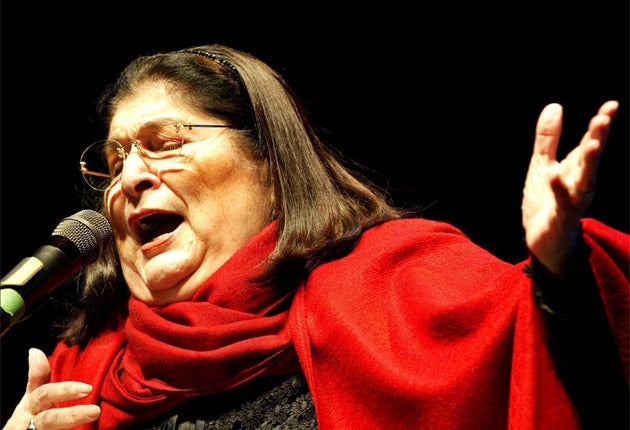Mercedes Sosa: Singer who sustained a generation of Latin Americans through difficult times

Mercedes Sosa, the Argentine folk singer who sang the songs of freedom that inspired millions of young people to believe in a fairer society, was one of the leading exponents of the Nueva Trova or New Song movement that grew out of Latin America in the 1960s and 1970s. During the worst days of the "Dirty War", when the military dictatorships in Argentina, Chile and Uruguay tortured and disappeared thousands of left-wing activists and their families, Sosa, or "La Negrita" as she was affectionately known to her fans across the world, was the voice of the voiceless. Essentially a vocal artist, rather than a songwriter, she was best know for her interpretations of Violeta Parra's classic, "Gracias a la Vida" ["Thanks, Life"] and the prayer-anthem written by Leon Gieco – Argentina's Bob Dylan – "Solo le pido a Dios" ["Don't ever let me become used to war"].
Her voice, at times deep, at others tender, was always commanding and often overwhelming. At her penultimate concert in London a few years ago, everyone sitting in my row appeared to be blinking – or failing to blink – back tears. "Anyone who did not live through those difficult times can not really understand how important she was. She was our icon," recalled Pablo Farba, Sosa's British agent and producer, whose parents were forced into exile after the Pinochet coup in Chile. "She worked to the highest standards and never compromised – which was why she preferred to go into exile than stay quietly at home."
Sosa, who was born into a humble family in the province of Tucuman, struggled from the start. But she was proud of her mixed heritage, indigenous Coya and French, and her long black hair which later earned her her nickname. When she was 15 years old she entered a radio talent contest under the name Gladys Osorio. Her prize – a two-month recording contract – was the stepping stone to a 60-year career that would see her perform at venues around the world, from the Barbican – she was thrilled to sing in London just after General Pinochet had been placed under house arrest in England – to the Sistine Chapel.
Her first album, La Voz de la Safra ["The voice of the harvest"] was recorded in 1959. The following year she released Songs with Feeling, produced by her first husband Manuel Oscar Matus, the father of her son, Fabian Ernesto.
In 1965 she debuted at the hugely popular Cosquin Festival, Argentina's premier folk music get-together. In 1979 she played a gig in La Plata which was stormed by the army, who arrested her on stage and detained the entire audience for almost 20 hours – a move which earned the authorities of the day international rebukes.
With a heavy heart she chose exile, first in Paris and then in Madrid. "Exile was very hard for her," the Argentinian journalist Gustavo Sylvestre observed. "It pained her deeply to be away, and she carried her sadness, her depression, like a grey cloud." Even though she had not been banned from returning to Argentina, she had by that time been forbidden to sing in public, and it wasn't until 1982 that she came back, just as the country was beginning to recover from the excesses of the ruling junta.
Sosa never gave up her strong political and feminist views and even though she once said that "it is the poetry that matters" she was delighted when President Menem was defeated at the polls by Nestor Kirchner – who had been a young activist during the Dirty War – and even more so when Cristina Kirchner won the last elections (stepping into the presidential shoes vacated by her husband).
Chico Mendes invited Sosa to join the Earth Council, an initiative to protect the environment as part of the Rio + Five meeting, and she was later named as a Unicef Goodwill Ambassador. She continued to sing, partnered on occasions by luminaries such as Pavarotti, Joan Baez and Sting.
A series of falls led to a two-year period of rest but she had recently released her 40th album, Cantora ["Singer"] which had just been nominated for several Latin Grammys – an award of which she was already the proud owner. In 2000, by then overweight and prone to health problems, she described herself as "a singer, a widow whose star sign is Cancer and the driver of a little Audi."
Her open coffin lay in state in the National Congress and three days' mourning was declared by President Kirchner. Presidents Bachelet of Chile and Chavez of Venezuela – not normally in agreement – both sent condolences. It was a sign of her cross-generational appeal that she could still sell out a concert 50 years after her first album release. As her friend, the veteran musician Charly Garcia wrote: "Negrita, you are in fact, a rock star."
Elizabeth Mistry
Haydee Mercedes Sosa, singer: born San Miguel, Tucuman, Argentina 9 July 1935; married twice (one son); died Buenos Aires 4 October 2009.
Join our commenting forum
Join thought-provoking conversations, follow other Independent readers and see their replies
Comments
Bookmark popover
Removed from bookmarks